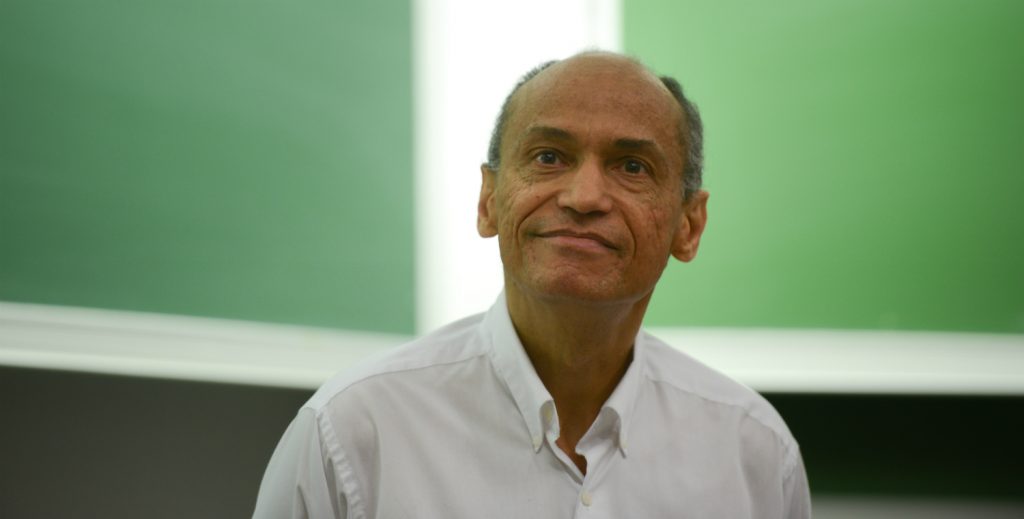
An alumnus of our department (PhD, 1985), Charles Mills is currently Distinguished Professor of Philosophy at the Graduate Center, City University of New York. He specializes in social and political philosophy, particularly in oppositional political theory around issues of class, race, and gender. His first book The Racial Contract (Cornell University Press, 1997) has become a seminal text in the study of imperialism, white supremacy, critical race theory, and the critique of liberalism. His sixth book, Black Rights/ White Wrongs: The Critique of Racial Liberalism, was published in 2017 by Oxford University Press.
In the latest issue of our annual magazine, Philosophy News, Professor Mills reflects on his time in Toronto, the present state of the discipline of philosophy, and current issues in racial politics. The interview is re-posted below:
Philosophy News: Your undergraduate degree was in physics, but you switched to philosophy in graduate studies. What attracted you to philosophy?
Charles Mills: Physics was not a free choice in the first place, but a consequence of my favourite humanities teachers leaving my high school, which severely restricted my options at the University of the West Indies. After graduation I taught natural science for two years, which only confirmed that I needed to get out of this career track sooner rather than later.
Meanwhile, dramatic things were happening.
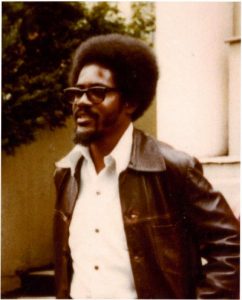
Guyanese historian and political activist Walter Rodney (Image: globalresearch.ca)
The 1970s were the high point of Jamaican, and broader Anglo-Caribbean, political radicalism. The 1968 banning of Guyanese historian Walter Rodney led to protests and riots, sparking a national debate whose overall consequence was the rebirth of radical politics (class, race). Riding on a wave of mass discontent, the opposition People’s National Party (PNP) was elected and announced a program of “democratic socialism.” Years of intense political struggle followed, locally and globally, as Prime Minister Michael Manley attempted, with other progressive Third World leaders, to lobby for a more equitable global economic order, incurring the wrath of First World conservative forces.
So it was in that context that I started looking for a subject that could provide a “big picture” overview of what was going on. With complete naivety about the field, I chose philosophy, not really knowing what I was getting into. It’s like that great exchange in Casablanca between Humphrey Bogart and Claude Rains: “I came to Casablanca for the waters.” “The waters? What waters? We’re in the desert!” “I was misinformed.”
PN: Tell us a little bit about your time in Toronto (MA, 1973-75, and PhD, 1977-1985). Why did you choose Toronto and how did your time here shape your career? Did anything in particular make a significant impact on you?
CM: I had won a Commonwealth Fellowship and could go to Britain, Canada, Australia, or New Zealand. I chose Canada, as the closest to home, and the University of Toronto as the best university in the country, and thus presumably home to the best philosophy department. But I thought it was safer to do an MA first to get a sense of what philosophy was like before I decided to embark on the doctorate. (And here I would like to thank John Slater, who—as he later told me at my 1985 graduation—pushed for me to be admitted, despite my almost complete lack of background in the subject.)
My crucial formative experiences were really extra-academic: the radicalization of the Anglo-Caribbean in the 1970s, and the challenge to the postcolonial/neocolonial social order. Given Toronto’s large Anglo-Caribbean population, this resurgence of the left manifested itself in a ferment of activity: the formation of support groups, and constant forums, rallies, and talks by visiting Caribbean speakers. So I became part of that scene [of] progressive campus, city, and Caribbean solidarity politics.
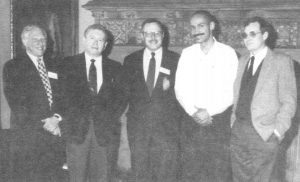
L-R: Joseph Rotman, Dow Marmur, David Novak, Charles Mills, and Frank Cunningham at a conference in Toronto in 1994.
Academically, I came to regard Marxism as most congenial to my interests. So I worked with Frank Cunningham and Danny Goldstick, the department’s Marxists, on an “analytical Marxist” dissertation on the concept of ideology. Frank and Danny were both key figures for my philosophical education, and though I no longer focus on Marxism in my writing, key left themes have continued to inform my work: materialism; skepticism about “ideal theory”; getting the actual history right; highlighting social oppression and exploitation, group dynamics and group interests; recognizing structural causation and the importance of locating the ideational in a sociopolitical matrix. My current project of developing a “black radical liberalism” to tackle racial injustice can be seen as the attempt to bring such commitments into a (transformed) liberal framework.
PN: Toronto is more historical in orientation than many other philosophy departments. Your most famous work, The Racial Contract, is very historically informed and yet very critical of European political philosophy. When did your critical interest in the history of philosophy begin? Do you wonder about what kind of philosopher you would be if you had completed your education in a department with a strictly contemporary focus?
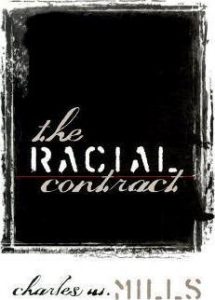
Mills’ book “The Racial Contract” was first published in 1996.
CM: Because of the unusualness of my career path, these factors were less important for me than for someone who came to philosophy out of an acquaintance with, and love for, the subject. In my case, it was much more a matter of struggling with a discipline I found very white, very resistant to what I wanted it to do. Remember this was largely before critical philosophy of race, before the global justice literature had really gotten off the ground, before philosophy began to confront the colonial past (actually we’re still basically in that “before”). Rawlsian “ideal theory” was the way to do justice, starting with societies conceived of as “cooperative ventures for mutual advantage” and completely lifted out of the real-world history of colonialism, imperialism, expropriative white settlement, Atlantic slavery, and so forth.
So the interest I would develop in the history of European political philosophy came out of my historical formation as a Third World/Global South subject, not from being at a historically oriented department. In fact, I didn’t do a single course in the history of European political philosophy as such while I was there. That all came a decade later, when I switched to working on race, and began to systematically educate myself about the role of race in the history of Western political philosophy.
PN: You’ve explored themes around the “epistemology of ignorance,” and white ignorance in particular, in which dominant groups subscribe to an “inverted” epistemology built around self-deception and non-knowings. In “White Ignorance” (2007), for example, you note the relationships between collective memory and the production of ignorance, which then obscure racial injustices and the need for reparations. The last year has seen increasingly public displays of white supremacy, many of which reproduce violences and iconography often dismissed as “in the past.” Are we any better off now than a decade ago (let alone a year ago) with regard to white ignorance, and has its heightened display helped or hindered this? What steps should we be taking today to resist white ignorance and other privileged group-based ignorances?

In 2016, Black Lives Matter activists protested at the Toronto Pride parade. Image: TVO.org
CM: I think it’s one of those complicated situations where we have both progress and regression. On the one hand, as a result of the activism of the Black Lives Matter movement, and the protests around Confederate flags and statuary, there is far more discussion of these issues in the public sphere.
On the other hand, the very airing of these subjects has exacerbated backlash from white Americans worried about losing their historically differentially privileged status, emboldened by a president whose white nationalist sympathies are not hidden. So white ignorance is simultaneously more exposed and under attack, and more militant and belligerent.
A further complication is that the old progressive strategy—striving to overcome “epistemic injustice” with the devastating exposé of “the facts”—has been pre-empted by the Orwellian advent of “alternative facts” and “fake news.” So a struggle at two levels is necessary: continuing to expose the lies and misrepresentations disseminated by the socially privileged, but also, at the meta-level (distinctly philosophical), defending rationalism and objectivism against a wave of obscurantism and relativism.
“White ignorance is simultaneously more exposed and under attack, and more militant and belligerent.”
PN: Has your approach to the classroom changed with the increased visibility of white supremacy? How do you address current affairs in your teaching and lecturing? In many of your lectures, you employ humour. Is this a deliberate pedagogical tactic, particularly in a field like critical race theory where discussing oppression can be disheartening?
CM: The joke I’ve been making is that however bad Donald Trump may be for the country, he’s been great for me!
It was much harder to use terms like “white supremacy” with a black president in the White House and widespread delusions that the United States had entered a “post-racial” epoch. Now, there’s an opening for changing the dominant discourse. I use humour not just because discussing oppression can be disheartening but because—especially for the largely white audiences of philosophy events—it disarms people, and gets the message across more effectively than through accusation and straight polemic.
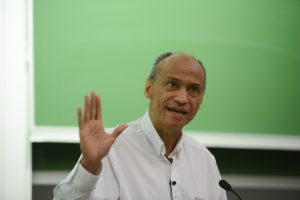
Photo: Gareth Smit.
The key point I try to bring home is that “white supremacy” should not be limited to particular extremist fringe ideological views, but should be taken as depicting a social system, one that privileges whites in a structural way at the expense of people of colour. In this broader, non-juridical sense, white supremacy extends far beyond American Jim Crow and South African apartheid and, indeed, characterizes the polities of Western modernity in general. And relatedly, the dominant varieties of liberalism have been racialized, rationalizing or obfuscating this system, whether (originally) through the representation of people of colour as racial inferiors (as in Kant) or (currently) through the evasion of the history of white racial domination and the need for corrective racial justice (as in Rawls).
This past term I did a seminar in “Corrective Justice,” intended to counter the misguided “ideal-theory” prioritization in mainstream philosophy of social justice as normative principles for a perfectly just society. Next term I’ll be co-teaching (with Sibyl Schwarzenbach) a seminar on “Rawls, Race, and Gender.” And together with Linda Alcoff, I co-organized a two-day interdisciplinary conference in March 2018 on “Racial Inequality.”
PN: You’ve remarked that philosophy is an “overwhelmingly white profession” and expressed a hope for “unwhitening mainstream political philosophy.” You wrote that philosophy “is one of the ‘whitest’ of the humanities” in The Racial Contract (1997). How can early-career philosophers—and all philosophers—make changes in this inequality? Why has philosophy ended up with this demographic makeup? What can white philosophers in particular do?
CM: The extreme whiteness of philosophy is a continuing puzzle. There’s an obvious synergy between the demographic and conceptual whiteness, [since the work of] people with no interest in the issues that differentially attract people of colour will continue to reflect this Euro-orientation, which will in turn alienate potential non-white grad students, thereby reproducing the pattern.
“We need an expansion of the canon that recognizes the multicultural/multiracial nature of humanity and its correspondingly multifaceted perspectives on what it is to be human.”
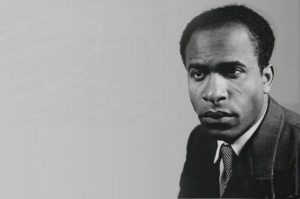
Psychiatrist, philosopher, activist, and writer Frantz Fanon. Image: libcom.org
But why has more progress been made elsewhere in the humanities, in literature, for example? I think three major factors are: one, the fact that race is not critically thematized in most of the vast 2500-year body of literature of Western philosophy; two, the defining disciplinary abstraction, which in conjunction with the unrepresentative demography, encourages idealizing abstractions (Onora O’Neill made this point many years ago) that abstract away from the situation of the subordinated, so that the “human” condition becomes the white male condition; and three, the corollary denial of “philosopher” status to people of colour who have reflected “philosophically” on their subordination, such as Frederick Douglass, W.E.B. Du Bois, Frantz Fanon, and many others.
The responsibility falls more heavily on established rather than early-career white philosophers, who— especially in the current market—are vulnerable in all kinds of ways. Two obvious moves would be self-education about the growing body of philosophical work on these themes (race, ethnicity, post-coloniality, and so forth), and the incorporation of such material into one’s regular philosophy courses (e.g., on metaphysics, physics, epistemology, philosophy of language, ethics, aesthetics, political philosophy, the history of philosophy). Limiting such work to demarcated “Africana Philosophy” or “Critical Philosophy of Race” courses perpetuates ghettoization, and reinforces the sense of white students in particular that these subjects are not real philosophy. We need an expansion of the canon that recognizes the multicultural/multiracial nature of humanity and its correspondingly multifaceted perspectives on what it is to be human.
SHARE
